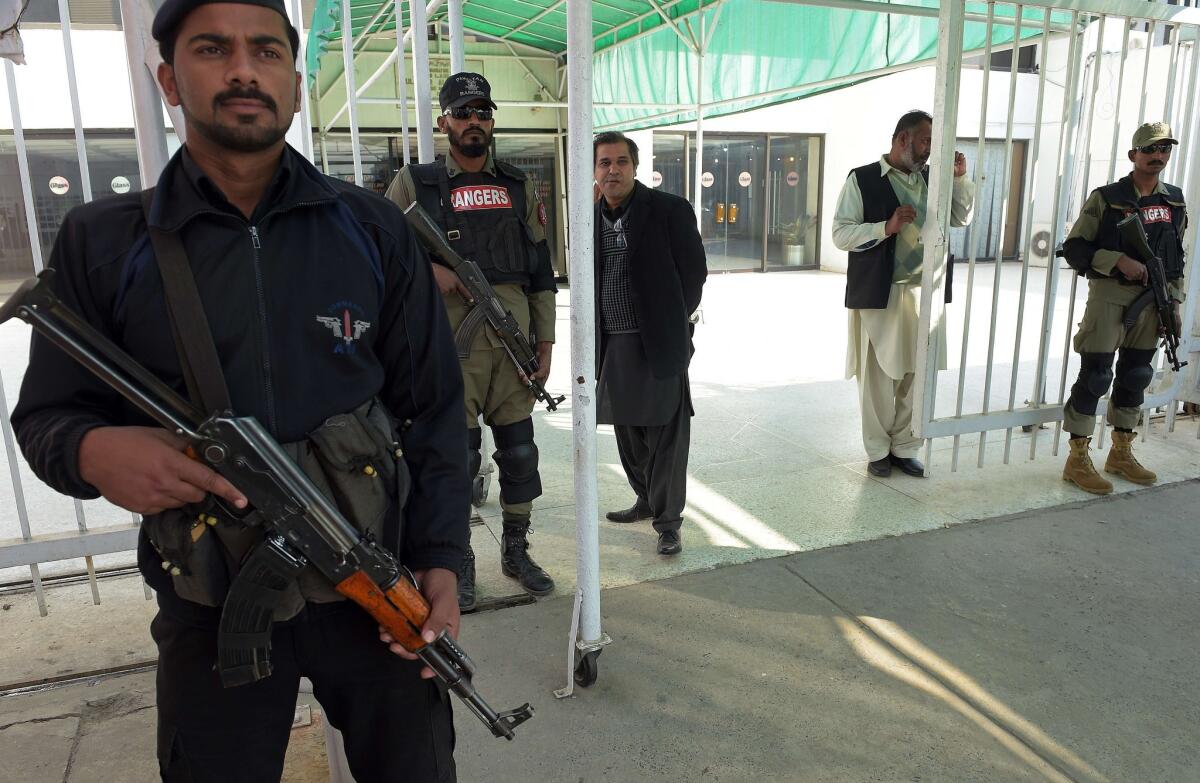Pakistani lawmakers approve military courts in terror cases

- Share via
Reporting from Islamabad, Pakistan — Ceding potentially far-reaching powers to the army, Pakistani lawmakers on Tuesday unanimously approved changes to the constitution to allow military courts to try civilian terrorism suspects in the wake of last month’s devastating school attack.
The legislation, which expires after two years unless renewed by parliament, is designed to speed up the trials of terrorism suspects by taking them away from civilian courts, where judges and witnesses are routinely harassed or killed and few convictions are obtained.
Pakistan’s lower house of parliament approved the changes by a vote of 247-0, enough for a two-thirds majority even with several Islamist parties and a major opposition party abstaining. The legislation was expected to pass the upper house later this week and become law.
Granting jurisdiction to military courts is among a series of measures aimed at cracking down on extremists since the Pakistani Taliban killed 134 students in a raid on an army-run school in Peshawar on Dec. 16. They reflect the ascendance of the military, which has ruled Pakistan for half its history, staged three coups and again appears to be asserting authority over foreign policy and terrorism matters.
Prime Minister Nawaz Sharif and members of his elected civilian government have endorsed the military courts, leading some critics to accuse them of surrendering to the army.
Interior Minister Chaudhry Nisar Ali Khan, arguing that Pakistan is facing “an extraordinary situation,” said military courts were “the need of the hour.” He invoked a comparison to the special courts the United States set up at Guantanamo Bay, Cuba, and other sites following the 2001 terrorist attacks, and said that military courts would not try civilians in nonterrorism cases.
But legal experts say the legislation grants broad authority to Pakistan’s army and amounts to a parallel judicial system with no civilian oversight.
“The concept of military courts is an alien concept in a democracy,” said Abid Saqi, a senior legal figure in the city of Lahore. “It is a soft coup.”
Lawyers’ groups were weighing whether to mount a legal challenge, but even Pakistanis who are apprehensive of the military’s growing power say the country is so traumatized by the massacre in Peshawar that few would openly question calls for swift justice in terrorism cases.
“This is not a normal moment in time,” said Moeed Yusuf, an analyst at the United States Institute of Peace, who just returned from Pakistan. “At this point the Pakistani nation is completely bruised, shocked and in a vengeance mode.
“It won’t last, and when it’s over people will ask whether the state did the right thing or if it was too bloodthirsty. At this time there’s no space for that argument.”
The day after the Peshawar attack, Sharif lifted a moratorium on the death penalty for terrorism cases, paving the way for hundreds of people to be executed within weeks. The move raised serious concerns among human rights groups who say many of those on Pakistan’s death row were convicted in shoddy trials in civilian anti-terrorism courts or after being tortured into confessing.
On Monday, the government granted a stay of execution for Shafqat Hussein, who was convicted of involuntary manslaughter a decade ago at age 14. Rights groups say he was subjected to torture and that the court that sentenced him did not have jurisdiction because his charges were unrelated to terrorism.
Under the new legislation, terrorism defendants will not have any right to appeal the decision of a military court. The federal government can also transfer pending cases to a military court.
Gen. Raheel Sharif, the powerful army chief, said recently that the establishment of military courts is “not the desire of the army, but need of extraordinary times.” Military and security leaders have long complained about the low rates of convictions in the overburdened civilian courts, often due to poor police investigations and a lack of protection for witnesses.
Security officials say that the civilian courts have freed more than 2,000 alleged terrorists, many of whom rejoined militant groups.
Critics of the military courts say the decision sidesteps the urgent need to reform the civilian courts. They also argue that it could stoke religious tensions if the new laws are used to target particular Islamist groups.
Fazlur Rehman, a conservative cleric who leads the largest Islamist party in parliament, is the only major political figure who opposed the bill. He said the legislation as written could be used to attack his group and accused the government of “trying to link religion with terrorism.”
“We believe that strict measures should be taken to control terrorism in Pakistan,” Rehman said. “But if only religious institutions are targeted, then it becomes controversial.”
One of Pakistan’s leading newspapers, Dawn, blasted the decision in an editorial this week.
“It is a sad time for democracy when an army chief so openly directs the political process,” the newspaper wrote.
“Sadly, the political leadership has abdicated its democratic responsibilities.”
Special correspondent Sahi reported from Islamabad. Staff writer Bengali reported from Mumbai, India.
For more news from Afghanistan and Pakistan, follow @SBengali on Twitter
More to Read
Sign up for Essential California
The most important California stories and recommendations in your inbox every morning.
You may occasionally receive promotional content from the Los Angeles Times.














